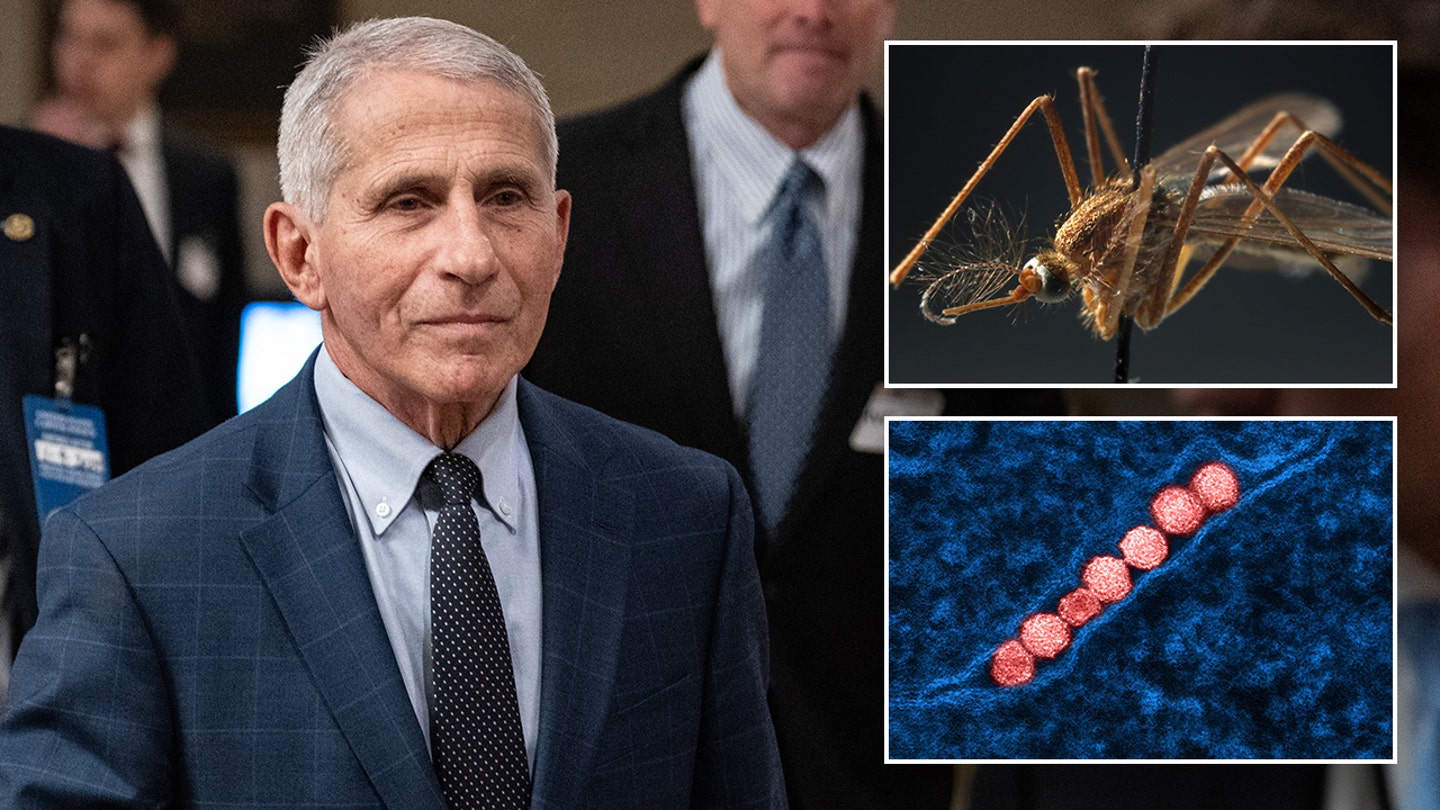Dr. Anthony Fauci, former director of the National Institute of Allergy and Infectious Diseases and former chief medical advisor to the president, was diagnosed with West Nile virus earlier this month, according to a spokesperson for Fauci.
Fauci, 83 — who was the face of the U.S. response to the COVID pandemic in 2020 — is now recovering at home after being hospitalized for six days.
He is expected to make a full recovery, the spokesperson told Fox News.
WEST NILE DEATH REPORTED IN TEXAS AS HEALTH OFFICIALS WARN RESIDENTS TO SAFEGUARD AGAINST MOSQUITOES
What to know about West Nile virus
As of Aug. 20, there were 216 West Nile virus cases in the U.S. across 33 states, per the CDC.
Among those, 142 cases were neuroinvasive (severe).
Since the West Nile virus first entered the U.S. in 1999, it has become the leading cause of mosquito-borne disease in the country, according to the Centers for Disease Control and Prevention (CDC).
Dr. Anthony Fauci, formerly the director of the National Institute of Allergy and Infectious Diseases and the chief medical advisor to the president, was diagnosed with West Nile virus earlier this month, according to a spokesperson for Fauci. (Getty Images)
In most cases, the West Nile virus — a flavivirus in the same family as yellow fever, dengue fever, Japanese encephalitis and the Zika virus — is spread when Culex mosquitoes bite infected birds and then bite people and other animals, per the CDC’s website.
The virus is not transmitted through eating or handling infected animals or birds — nor is it spread through physical contact, coughing or sneezing.
IN A POTENTIAL OUTBREAK, IS BIRD FLU TESTING AVAILABLE FOR HUMANS? WHAT TO KNOW
A vast majority — around 80% — of the people who contract the virus will not experience any symptoms, the CDC states on its website.

In most cases, the West Nile virus — a flavivirus in the same family as yellow fever, dengue fever, Japanese encephalitis and the Zika virus — is spread when Culex mosquitoes bite infected birds and then bite people and other animals, per the CDC’s website. (Drew Angerer/Getty Images, main, E. Jason Wambsgans/Chicago Tribune/Tribune News Service via Getty Images, top right, NIH-NIAID/IMAGE POINT FR/BSIP/Universal Images Group via Getty Images, bottom right.)
“It causes a rash and other symptoms, including swollen lymph nodes, which other viruses in its class do not exhibit,” Dr. Marc Siegel, senior medical analyst for Fox News and clinical professor of medicine at NYU Langone Medical Center, previously told Fox News Digital.
“It only affects the nervous system 1% of the time and is rarely fatal.”
IN COLORADO, PLAGUE CASE CONFIRMED IN HUMAN, HEALTH OFFICIALS SAY: ‘MUST BE TREATED PROMPTLY’
Around one in five people will develop febrile illness, which is marked by a fever along with body aches, headache, joint pain, diarrhea, rash and/or vomiting.
These symptoms usually go away on their own, but some people may have lingering weakness and fatigue months after infection.
West Nile affects the nervous system 1% of the time and is rarely fatal.
In rare cases — about one in every 150 infected people — the virus can lead to serious conditions affecting the nervous system, such as encephalitis (inflammation of the brain) or meningitis (inflammation of the membranes that surround the brain and spinal cord), the CDC states on its website.
CLICK HERE TO GET THE FOX NEWS APP
Those who develop serious illness may experience headache, stiff neck, high fever, disorientation, vision loss, muscle weakness, convulsions, tremors, coma or paralysis, which occur when there is viral infection of the central nervous system.
Among people who have this invasive form of the illness, around 10% will die.
It affects the nervous system 1% of the time and is rarely fatal, statistics show.

Around one in five people will develop febrile illness, which is marked by a fever along with body aches, headache, joint pain, diarrhea, rash and/or vomiting. (iStock)
While anyone can potentially develop severe illness, the highest-risk groups include those over 60 years of age, people who have had organ transplants and those with diabetes, cancer, high blood pressure, kidney disease, immune disorders and other certain medical conditions.
“The virus’ effects can be quite serious in the elderly,” Siegel noted.
Diagnosis and treatment
Those who think they might have been infected with WNV should be assessed by a health care provider, the CDC states.
Diagnosis of the infection can be made based on evaluation of symptoms, recent exposure to mosquitoes and testing of blood or spinal fluid.
OUTBREAK OF KLEBSIELLA PNEUMONIAE BACTERIA INFECTS 31 PATIENTS AT SEATTLE HOSPITAL
Health care providers will typically recommend treating symptoms with over-the-counter pain medications and getting plenty of rest and fluids.
Those who experience severe illness may need to be hospitalized for supportive care.
Preventing the virus
There is currently no vaccine for West Nile virus.
“The virus can be contained through public health measures including more insect repellent with DEET, longer sleeves and less stagnant water in our backyards,” Siegel said.
CLICK HERE TO SIGN UP FOR OUR HEALTH NEWSLETTER
Trying to kill adult mosquitoes by spreading too much insecticide can be problematic, the doctor warned.
“Animals, people with asthma and insects that would otherwise kill the mosquitoes are affected.”

When spending time outdoors, it is recommended that people apply insect repellent containing DEET or other EPA-approved ingredients. (iStock)
The most effective means of prevention is to protect against mosquito bites, the CDC confirmed.
The agency’s recommendations include using insect repellent, wearing long-sleeved shirts and pants, and taking steps to control exposure to mosquitoes — particularly at dawn and dusk.
For more Health articles, visit www.foxnews/health
Eliminating any standing water outdoors can help prevent mosquitoes from breeding.
Fox News’ Michael Dorgan and Danielle Wallace contributed reporting.
